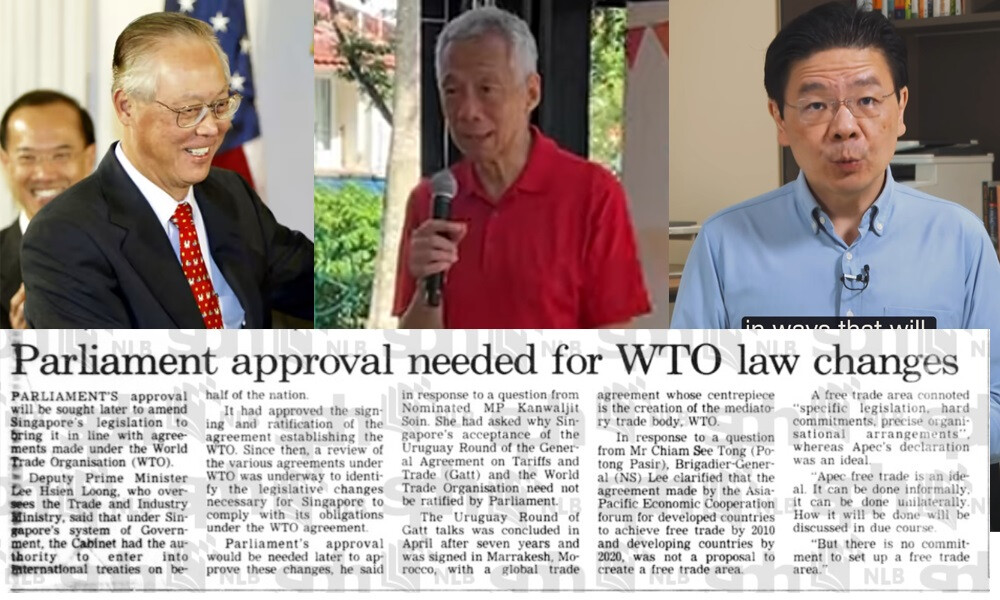
Singapore - Global chaos alone cannot explain Singapore's vulnerability. Years of liberalized trade policies, pursued with a blind faith in a crumbling world order, are the root cause. The People's Action Party (PAP) did not prepare for the collapse, and now they tell us to prepare. Where was their foresight?
Prime Minister Lawrence Wong's characterization of the US's sweeping 'Liberation Day' tariffs as a 'tectonic shift in the world order' is an accurate diagnosis of its impact, but a convenient sidestepping of an uncomfortable truth. Singapore's current vulnerability is not merely a byproduct of global turmoil.
It is the result of policy decisions made over years by the very leaders who now urge us to brace for impact – decisions made without sufficient foresight or contingency planning.
For decades, the ruling People's Action Party (PAP) aggressively liberalized Singapore's trade and labor policies, working hand-in-glove with the United States and multilateral institutions under the belief that free trade would guarantee prosperity.
In the short term, it worked. But that belief came at a cost: dependence.
The PAP's bet was that the global rules-based system would hold. Protectionism, nationalism, and unilateralism were relics of the past, they believed.
But the tariff walls of the Trump era and the outright rejection of World Trade Organization (WTO) principles today starkly illustrate how naive that assumption was. We were told this was the only viable strategy, but where were the safeguards?
Now, as the US dismantles the very trade architecture it built, Singapore finds itself overexposed and underdefended. And instead of accountability, we are offered rhetoric about 'resilience,' 'unity,' and 'preparing for a dangerous world.' But who failed to prepare in the first place?
Singaporeans are told to brace for more shocks, to steel ourselves mentally, and to have faith in our reserves and our cohesion.
But reserves do not fix policy misjudgments. And cohesion cannot erase the fact that we willingly walked into this trap. We hitched our future to powers beyond our control, and now we must stoically weather the fallout.
Senior Minister Lee Hsien Loong echoed these sentiments, urging Singaporeans not to be 'distracted by strange notions or simplistic solutions.'
But what were the PAP's solutions?
To bet everything on globalization while ignoring the growing signs of geopolitical fracturing?
To declare that Singapore must always stay ahead, without laying the groundwork for when the system we depend on collapses?
Being caught flat-footed by a crisis of one's own making is not a hallmark of leadership.
Yes, Singapore is a small and open economy. But smallness cannot be a justification for helplessness. We had agency, we could have foreseen. And we squandered much of it by placing our faith in a global order that was always destined to fray.
Singapore's founding leaders, like Goh Keng Swee, understood the importance of leveraging multinational corporations (MNCs) not just for economic growth, but as platforms for capability building.
The goal was never to remain perpetually reliant on foreign capital. It was to absorb their knowledge, develop our own technological base, and ultimately create our own MNCs. That vision was bold, ambitious, and for a time, it worked.
But somewhere along the way, that ambition was replaced by complacency.
Today, we remain tethered to foreign MNCs, offering generous tax breaks and importing low-wage labor to maintain low costs.
Instead of climbing up the value chain, we have locked ourselves into a low-tax, low-wage model that prioritizes short-term investor appeal over long-term national resilience.
If the PAP wants to talk about plans, it should start with reflection. The first step is acknowledging that the era of rules-based globalization is over. And we must acknowledge that we did not build a Plan B for when it ended.
And if there is no Plan B, then it is time for new hands on the tiller to create one.
[Copyright (c) Global Economic Times. All Rights Reserved.]






























